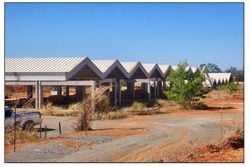Dear Editor,
I note Mr. Sherwood Lowe’s letter, `Coalition gov’t has activated several of the 1999/2000 constitutional reforms.’ First let me deal with the one important gap in the analysis of Mr. Lowe, where he completely avoids reference to the Coalition’s 2020 manifesto content on constitutional reform. This is it, in total:
“* Continue The Work Of The Constitutional Reform Consultative Commission
* Continue The Allocation Of Funding For Country-Wide, Community Consultations
* Commit To Contributing To A Constitution Which Reflects The Will Of The Wider Society, Country-Wide.”
As I noted in my previous letter, the first point is a lie, one on which the other two points have been premised – you cannot ‘continue’ the work of a Commission that does not exist, just as I cannot ‘continue’ to drive a car that has not been built, no matter how glorious the blueprint is for its design.
The coalition needs to directly explain – not through proxies – this glaring mistruth on a fundamental matter in its manifesto. The Constitutional Reform Consultative Commission, when legally constituted and operationalized, is what will begin its own work, with funding as well as a consultation plan to reflect “the will of the wider society, country-wide.”
Now to deal with the four ‘truths’ Mr. Lowe presents to excuse the administration’s abject failure in this area:
“(i) that, in effect, constitution reform has continued since 2015”
This is at best untrue. Ad hoc implementation of some marginal measures recommended since 2001 is not reform at all, and certainly not on the scope promised by the coalition. Mr. Lowe even includes the Natural Resources Fund, which is not a constitutional measure and neglects to point out that the Integrity Commission remains so toothless that it had no funds to publish the names of government officers who missed the deadlines for statutory declarations, the overwhelming number of whom are coalition legislators. Implementing marginal measures was not what was promised on the campaign trail in 2011 and in 2015 – constitutional reform was.
(ii) “that much scope exists within the letter and spirit of the already-enshrined 1999/2000 constitutional changes to encompass many of the scattered suggestions for new reforms.”
I’m not sure what he means by this. What I do know that there are have been clear issues that need to be directly addressed when it comes to genuine and meaningful constitutional reform. The core ones as identified in the 2017 UNDP Constitutional Assessment Report that I’ve highlighted previously are:
1. Hyper-presidentialism
2. Power sharing
3. Electoral reform
4. Bicameralism.
5. Land rights.
6. Clarity on presidential term limits (this has since been clarified by the CCJ decision)
7. Fundamental rights broadening and strengthening
8. Decentralization and devolving powers and resources to subnational authorities:
“(iii) no grassroot or public demand for structural change has been collectively voiced”
This is a curious statement to make. When the APNU+AFC government of Guyana decided, three months after gaining public office, to raise the salaries not just for itself, but for PPP parliamentarians, there was no grassroots or public demand collectively voiced for them to do so but they did it anyway. When it is that they secretly signed an extremely lopsided deal with Exxon, continuing the lack of transparency in signing away our oil blocks that started under the PPP, there was no grassroots or public demand for that either. In 2011, APNU and AFC were separately elected to a combined parliamentary majority based on manifestoes and campaigns that posed constitutional reform as a fundamental pillar. When they were collectively elected in 2015, it was on a campaign and a manifesto that dealt directly with constitutional reform as a fundamental pillar. That was the grassroots public demand that was needed, one that the coalition has betrayed.
“(iv) no consensus has emerged, or is soon likely to, among the political parties for scrapping the winner-takes-all system”
That is untrue. The consensus between the APNU+AFC Coalition and the PPP is that they don’t want to scrap the winner-takes-all system. Both continue to benefit from it, even while pretending to fight each other. That is why, with high level representation on the Standing Committee on Constitutional Reform by both of them, the Commission only met five times in five years and nobody quarrelled about it and sought to cast blame on the other. That is why, despite tremendous powers afforded to the executive, despite numerous and costly audit reports on PPP corruption, not a single person even low down in the PPP hierarchy has been successfully prosecuted for corruption and why the PPP’s infrastructure remains fundamentally in place, both within the public service and the favoured private sector/political donor community.
The position of The Citizenship Initiative remains that there is no great mystique or essential difficulty when it comes to constitutional reform – there is simply a great deficit of integrity, courage and political will within the current political leadership to get it done. We have already addressed the key parameters for constitutional reform and the pathway towards it, as is evidenced here:
As contained in my last letter, we have gone as far as designing a bicameral legislature, and we have broken ground when it comes to transparency in campaign financing. We’ve done all this as a party formed three months ago.
It is time that the excuses stop, and the major political players stop depending on proxies to defend the unnecessary inaction and betrayal of promises that they are too afraid or ashamed to directly defend themselves.
Yours faithfully,
Ruel Johnson
The Citizenship Initiative




